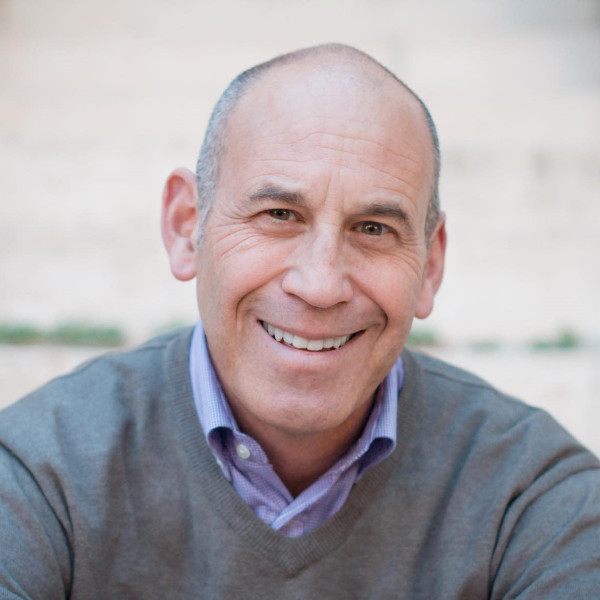Interviews with Olim
Each month, we interview an oleh or olah for our newsletter.
We invite you to read the stories of LGBTQ+ people who have made Israel their home.
"I believe that I am a part of the greatest experiment in Jewish history."
Interview date: December 2020
Q. Where were you born and where did you grow up?
A. I was born in Brooklyn, NY and grew up in a small town in the middle of Long Island called Islip. I grew up less than a half mile from the beach. I’ve always been attracted to the water- I find both great power and serenity in the water.
Q. At what age did you come out? And how did it go?
A. I came out to myself when I was around 12 or 13 years old. But I came out to my parents at a much later age – around 21 or 22 years old. My parents were at first a bit perplexed and confused, but my brother and sister were very understanding and compassionate. My mother became involved in PFLAG and in 1981 we marched together in the NYC Gay Pride Parade. In those days, many parents shunned or abandoned their children when they came out. I was very blessed to have parents who eventually supported me fully.
Q. Were you involved at all in the LGBT community back home?
A. I lived in Los Angeles for 25 years; I was the cantor at a 1000-family Reform Jewish congregation in west Los Angeles. Eventually when I came out at the synagogue, I realized that I was both a role model and a source of information and comfort for many of the members of the community.
When I first arrived at the synagogue (1984) we were in the middle of the AIDS epidemic. For many years, I was part of a synagogue-based group that provided lunches to AIDS patients who were receiving outpatient care at Day Centers.
I also helped fundraise for AIDS services through APLA by participating and raising money in the AIDS Marathon and the San Francisco to Los Angeles AIDS Ride – two amazing events that brought awareness to thousands.
Q. What is your involvement (if any) in the LGBT community in Israel?
A. I’m not particularly involved here.
Q. How long since you made Aliyah?
A. I made aliyah in July 2013.
Q. Did you move here on your own or with family/friends/significant other?
A. I made aliyah with my husband and our cat, Merlin.
Q. Why did you make Aliyah?
A. Hmmm… why did I make aliyah? Life-long Zionists and I believe that I am a part of the greatest experiment in Jewish history.
Q. How is it going so far?
A. It’s ok. Honestly, we live in Jerusalem and like the Amichai poem says, “the air of Jerusalem is heavy”. There are days when I truly love it here – there’s a beauty and grandeur and history that is unsurpassed. And other days I just want to scream, “Get me out of here…”
Q. What do you do in terms of work?
A. I teach at Hebrew Union College. I teach Jewish music and liturgy to our first year cantorial students. I also have a one-person show that tells the story of our aliyah interwoven with stories of my grandparents’ immigration from Russia to the USA in 1908. It’s a full-length musical – about an hour and 20 minutes (all in English) and I tour the USA as an artist in residence with the show. But since Covid 19, I’ve been doing performances virtually.
I’m also the cantor for a Reform congregation in Milan, Italy. But since February, all of our tefillot have been online.
Q. How is your Ivrit?
A. I’m a perpetual upper intermediate/lower advanced student. I went through Ulpan level dalet or hey… but now I’m taking a terrific online class at This is Not an Ulpan. Finally, I’m thinking I might break through my intermediate plateau.
Q. What has been your biggest challenge so far?
A. Honestly, I’m dismayed by the level of corruption in the government. It’s amazing how a sitting prime minister could be indicted and still serve. There is no shame or embarrassment here. For example, politicians who were jailed or accused of wrongdoing in a position return in that same position and everyone thinks that’s ok.
I’m also astounded how right-wing members of the LGBTQ community can be. It’s as if they don’t understand their own collective history.
Q. How do you perceive the Israeli LGBT community?
A. I think the Israeli LGBTQ community is much like other communities: trying to obtain equal rights and not being perceived as “other”.
Q. How is being LGBT in Israel different to back home?
A. My husband and I are a long-term married couple. We’re together 30 years. Life isn’t much different: we go to work, come home, eat dinner, watch Netflix, scream at the evening news, and do it all over again. We have a good circle of friends who, in normal times, we would socialize with more. But right now, we’re sort of sequestered in our own bubble.
Q. If you were making aliyah now, would you do anything differently?
A. I can’t really think of anything… maybe load up on those peanut butter-filled pretzels from Trader Joe’s.
Evan

Our Newsletter
Sign up if you would like to receive a monthly email listing events of interest to LGBT English-speakers in Israel, an interview with an oleh/olah and other useful information.
Want to be interviewed?
Complete the form below and we will get back to you.
Our Newsletter
Sign up if you would like to receive a monthly email listing events of interest to LGBT English-speakers in Israel, an interview with an oleh/olah and other useful information.
Want to be interviewed?
Complete the form below and we will get back to you.


